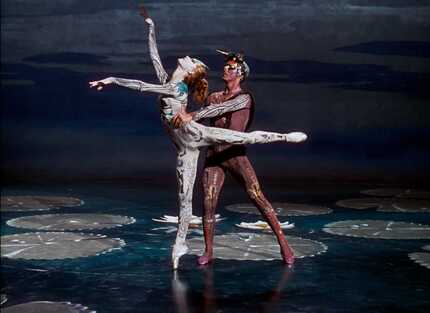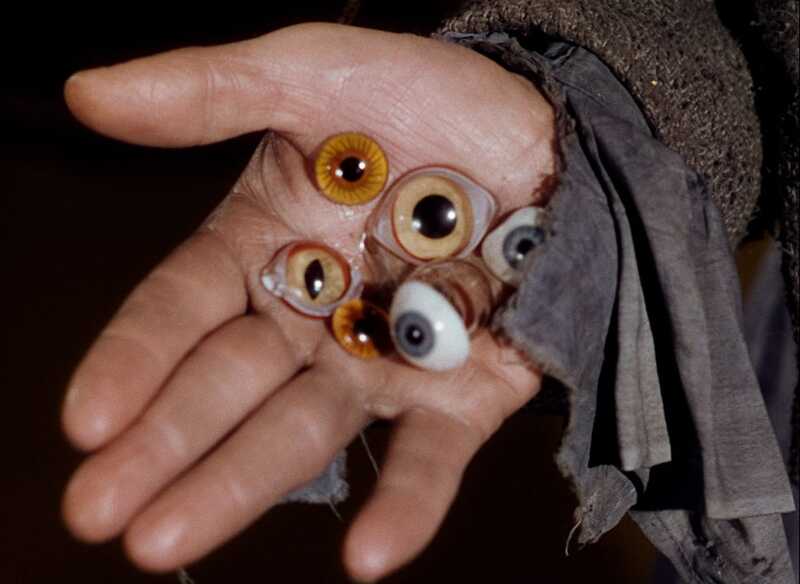Blu-ray Review: THE TALES OF HOFFMAN, A Majestic Opera Gets Majestic Release

Michael Powell and Emeric Pressburger were one of the best directing duos of the 20th century; their varied output included comedies, drama, war stories, and a few musicals. Though none was quite so extravegant, rich, and ambitious as The Tales of Hoffman. Based on the fantasy opera by Jacques Offenbach, who is turn based his opera on the fantastic tales of E.T.A. Hoffman, Criterion has a newly restored edition, with rediscovered footage, as well as a host of extras that are a feast for the eyes. If ever a film was as deserving of extras, both visual and aural, it's a film like this, a rather rare and unique opera film, which combines the best of theatre, opera, and cinema.
A story within a story: Hoffman (Robert Rounsville) has come to see a performance by his love, ballet dancer Stella (Moira Shearer). At intermission, he and many other patrons take a drink at the bar next door. His rival for Moira's affections, Lindorf (Robert Helpmann), intercepts a note to Hoffman from Moira; so Hoffman, feeling slighted, remains in the bar and tells the story of three other loves, and how they pale in comparison to Moira.
The opera unforlds over each of these stories, each more fantastical than the last. The first has Hoffman falling in love with a mechanical doll (Shearer) before he realizes that she is artifical and can never love him back. In the second, Hoffman falls in love with a Venetian courtesan, Giuletta (Léonide Massine), who steals his reflection for a magician. And in the third, Hoffman's love Antonia (Ann Ayars) is a soprano who must not sing less she dies; and once again, a rival of Hoffman's ensures her death.
There was definitely a heydey and a style of musicals in the mid-20th century, and while Powell and Pressburger lean into much of it, they also realize that an opera is not quite the same, particularly a fantastical opera such as this. Everything is grand: taking full advantage of a huge sound stage, the set and production design capitalizes on the richness, depth, and grandeur afforded at that time: make-up is clear and theatrically exagerrated, heightened by the story and music. The sets, furniture, and backdrops are larger than life. It's such an attention to detail, to be sure not to lose the theatricality of the story, that the directors blend it seamlessly with the cinematic.
As is the plot, this is a series of interconnected story, and watcing it on screen, it feels like we're invited to get comfy and watch as we're bombarded with this feast for the eyes and ears. Even watching from home, the grandeur is not lost. It's wonderful to see the details in the swirls of makeup on the character's faces, as well as a wide shot of figures dancing on the painted staircase on the ground. Powell and Pressburger realising what they could achieve with the camera that couldn't be done on the stage: angles that would help with the uncanny, fantastical mode of the story: double exposures, multiple frames in a single shot, whatever editing techniques were 'cutting edge' at the time were brought into play, to allow the filmmakers as more scope as possible to tell this story.
And it is served well by it; and more so by the performances. Given that this was filmed, many of the roles were split - one person acted and danced on the screen, while another (a trained opera performer) provided the singing. The matching of body and voice is seemless, and especially the performances of Helpmann and Massine. There is an exagerrated quality as befits this kind of theatricality, and yet it is not too much for a film, given how Powell and Pressburger present the story, as larger-than-life.
It's a marvel to watch on all counts: the dancing, the acting, the singing, the story, and how Powell and Pressburger find the balance between theatre and film, utilizing the strengths of each for an old-fashioned grand cinematic experience.
Extras
The Tales of Hoffman feels like the golden age of technicolor, a film that takes every advantage given by cinema to enrich the colours and depths of the story, and the restoration is impeccable. Even if you're watching it at home, it's hard to deny the feast for the eyes. This release, with its 4K restoration by The Film Founsation and the BFI Nation Archive, is enhanced by newly discovered footage, and with the uncompressed monaural soundtrack, it's also a feast for the ears. I do recommend keeping your viewing space as dark as you can to fully appreciate the work done to being it as close as possibly to original film print glory.
Film historian Ian Christine provides an insightful essay, one that shows that The Tales of Hoffman was both something of an outlier to the previous films of Powell and Pressburger, and at the same time a cumulation of their influences, and possibly the best of their collaborations. By combining their love of theatre, silent cinema, and musicals, they created this magnificent, dark fantasy, utilizing so many techniques that would enhance the story through cinema, and one that would become influential to future filmmakers.
It's certainly a treat to have commentary provided by Martin Scorsese. Given his love and knowledge of world cinema, it's not surprising that he would be a fan of this film, and he brings his signature depth and breadth of knowledge to his commentary (from 1992 but still relevant, of course). His comments on how Powell and Pressburger make certain decisions, his insider perspective on directing, and most importantly, his love of the story and performances make watching the film with commentary almost a necessity to fully appreciate it. Adding to this is commentary as well by critic Bruce Eder; he brings a history of the film, in its development, production, and post production, that gives interesting insights. It feels like an audio essay accompanyment to the film.
George A. Romero is not likely a name that would come to mind when you think of a fan of this film; that's why his interview, and his description of the growth of his admiration for the film, is so relevant to know how a wide range of films can influence someone whose work seems to so counter to that which they praise. Romero recalls being taken to see The Tales of Hoffman by his aunt and uncle, instead of his first choice, Tarzan, and how that spured him to rent the film several times as an adult. He studied the technical techniques used by Powell and Pressburger and would use similar in his own films, and how he saw it as a precurser to music videos (an accurate observation).
A gallery of behind the scenes photos is a nice treat, for a film of this era (if nothing else, to see how large the cameras were). But it's Hein Heckroth'c collection of production design drawings that are a real treat - these are ideas he had, more interpretations of the text, and display perhaps the subtext and inner life of the film, strange and mutated, inviting the grotesque to be more fully on display. This pairs nicely with the inclusion of Powell's short film The Sorcerer's Apprentice, made in 1957 but feeling like almost a narrative and stylistic prequel to the film.
The Tales of Hoffmann
Director(s)
- Michael Powell
- Emeric Pressburger
Writer(s)
- Dennis Arundell
- Jules Barbier
- Michael Powell
Cast
- Moira Shearer
- Robert Rounseville
- Ludmilla Tchérina








